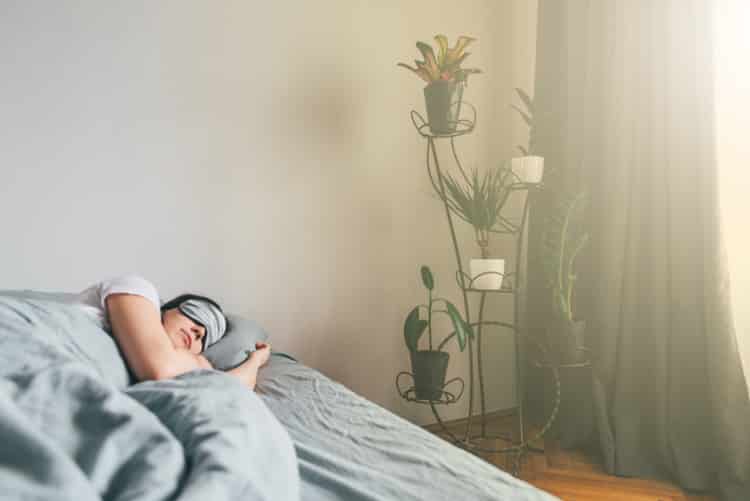What Is Insomnia? (The Real Reason You May Not Be Sleeping Well)

A good night’s sleep is priceless. It allows you to feel rested and refreshed the next day.
And that can make difficulty sleeping especially disruptive and frustrating.
If you struggle to fall asleep or stay asleep and often feel fatigued, unfocused, or irritable throughout your day, you are certainly not alone.
Just how common is insomnia, though?
According to the American Academy of Sleep Medicine:
- 30–35 percent of American adults have brief insomnia symptoms.
- 15–20 percent have short-term insomnia disorder, which tends to last less than three months.
- 10 percent have chronic insomnia disorder, which occurs at least three times per week for at least three months.
You may be wondering if your difficulty sleeping is considered insomnia. And if so, when should you seek help?
In this post, we’ll define insomnia, the types of insomnia, long term risks, common causes, and a few tips you can use to get a better night’s rest (starting tonight).
Curious if hypnosis could help you sleep well?
Take our hypnotizability test and find out!
What Does Insomnia Look Like?
Insomnia is defined as habitual sleeplessness or the inability to sleep.
There are a few different types of insomnia, and your difficulty sleeping may not look the same as someone else’s.
Acute Insomnia
This type of insomnia is short-term and usually caused by some kind of distressing life event, such as grief or loss, change in career, or jet lag.
 Chronic Insomnia
Chronic Insomnia
Chronic insomnia is marked by a long term pattern of sleep difficulty. Insomnia is usually considered chronic if you have issues sleeping at least three nights per week for three months or longer.
Comorbid Insomnia
This type of insomnia co-occurs with another mental or physical health condition, such as a concussion, arthritis, anxiety or depression.
Onset Insomnia
This is marked by difficulty falling asleep and may occur alongside acute or chronic insomnia.
Maintenance Insomnia
This is the inability to stay asleep. You may be able to fall asleep without much trouble, but often wake up in the middle of the night without being able to return to sleep.
Each type of insomnia disrupts your sleep cycle and impedes your ability to feel rested and recharged. Not being able to sleep through the night can cause a number of other health issues, too, both in the short and long-term.
What Are The Risks Linked to Insomnia?
People who sleep well at night have been shown to enjoy longer lives, lower risk of dementia and fewer heart problems.
Health Line also reports that insomnia is tied to stroke, asthma attacks, seizures, weak immune system, sensitivity to pain, inflammation, obesity, diabetes, high blood pressure, and heart disease.
 There are also mental health factors to consider. People who struggle with anxiety, depression, and other mental health concerns tend to report trouble sleeping.
There are also mental health factors to consider. People who struggle with anxiety, depression, and other mental health concerns tend to report trouble sleeping.
In the short term, insomnia can affect your focus, work performance, sex drive, memory, and judgment. Being tired can make you crave comfort foods, which can lead to weight issues. And, daytime sleepiness can be dangerous, because it can impede your ability to drive or operate machinery.
Curious if hypnosis could help you sleep well?
Take our hypnotizability test and find out!
What Causes Insomnia?
Insomnia doesn’t have a single cause. There may be a variety of factors that contribute to sleep issues, which can make it hard to treat on your own.
However, understanding the factors that may be contributing to difficulty sleeping is the first step in identifying what is causing your sleep problems (and how you can respond).
Depression and/or anxiety
Insomnia is actually used as a diagnostic tool for both depression and anxiety. It can be difficult to know what comes first: the chicken or the egg—is insomnia contributing to depression or is anxiety affecting your ability to sleep.
What we do know is that people with insomnia report greater depression and anxiety levels.
Chronic stress
Are racing thoughts keeping you awake at night? Maybe it’s an upcoming meeting at work, an overly busy schedule, or replaying the past day’s events on repeat in your mind? Without any way to unwind, chronic stress can interrupt sleep.
Pain or discomfort at night
You might be tossing and turning because you can’t find a comfortable position. Aches, pains, inflammation, itching and injuries can all make it hard to fall asleep and stay asleep.
Sleep apnea
Sleep apnea is a sleep disorder in which breathing stops during sleep. People with sleep apnea awake gasping for air. Oftentimes, the sleep aids that come with this disorder, like a breathing mask, can also be very uncomfortable and make it hard to fall asleep at night. But most people adapt to the discomfort after a period of adaptation.
Restless leg syndrome
Restless leg syndrome results in uncomfortable sensations in the legs paired with the irresistible urge to move your legs as a way to relieve these sensations. If you experience itchiness, pins and needles, or “creepy crawly” feelings, it’s no wonder you’re having trouble sleeping! And these uncomfortable feelings could mean that you’re dealing with restless leg syndrome.
Circadian rhythm disturbances
Circadian rhythm disturbances are another way of saying your body’s internal clock isn’t functioning properly. These come with continuous or occasional disruptions in sleep patterns.
When there’s a mismatch between the internal body clock and external factors regarding timing and duration of sleep, you may experience lack of sleep or oversleeping, both of which can result in impaired functioning.
Some medications
If you’re taking any daily medication, it’s helpful to know about the side effects. Some medications—like Zoloft, psychostimulants, amphetamines, anticonvulsants, decongestants, steroids, and a lot more—are known to cause sleep disturbances.
Check in with your doctor if you believe medication may be contributing to difficulty sleeping.
Adrenal fatigue
Your adrenal glands excrete stimulating hormones that are essential to your daily functioning. If adrenaline and cortisol are produced at the wrong times, however, it can leave you tossing and turning when you’d rather be snoozing.
A Good Night’s Sleep Is Within Reach
Insomnia can disrupt everything from motivation and daily functioning to your career and relationships. That’s why getting the right info can be an empowering step toward recovery.
We hope this quick look at insomnia—what it looks like, associated health risks, and factors that may be causing sleepless nights—gives you a clearer picture about your own difficulty sleeping.
And to learn more about how to get a better night’s sleep, check out our ultimate guide to sleep or one of our other helpful resources on natural sleep aids or sleep hygiene.
Curious if hypnosis could help you sleep well?
Take our hypnotizability test and find out!


